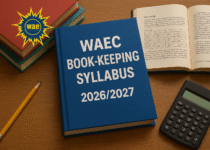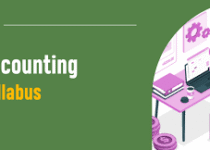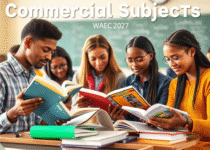WAEC Igbo Syllabus 2026/2027 & Textbooks
The WAEC Igbo Syllabus 2026/2027 & Textbooks includes a list of recommended textbooks for written literature, such as the prose “Juo Obinna” by Tony Ubesie. The syllabus is divided into two papers and covers language skills (comprehension, composition, grammar, and translation) and literature (oral and written). The main topics include Igbo culture, sound systems, and various forms of oral literature like folktales, proverbs, and poems.
Contents
Objectives
- After acessing this syllabus, students must be able to speak, read and write Igbo properly and communicate effectively in it
- Candidates must familiarize themselves with the sound system, grammatical structures and other features of the Igbo language
- Students must expose themselves to the Igbo culture – customs, institutions, worldview, etc
- Candidates should provide them with the necessary tools needed for creative writing and appreciation of Igbo language and literature
Recent Posts
- WAEC Islamic Religious Studies (IRS) Syllabus 2026/2027
- WAEC Government Syllabus 2026/2027 and Textbooks
- WAEC Arabic Syllabus 2026/2027 & Textbooks
- WAEC Syllabus For Economics 2026/2027 & Textbooks
- WAEC Auto Electrical Work Syllabus 2026/2027 & Textbooks
WAEC Igbo Examination Guide
The examination will consist of two papers—Paper 1 and Paper 2—which together form a composite paper to be taken in a single sitting. All instructions will be written in Igbo, and candidates must answer all questions using the standard orthography and metalanguage of the Igbo language.
Paper 1 will be an objective test comprising 60 multiple-choice questions to be answered within one hour, totaling 60 marks. It is divided into three sections: Language (Section A), Literature (Section B), and Culture (Section C). Section A will include 30 questions on various aspects of language such as comprehension (10 items), composition/letter writing (4 items), sound system (6 items), grammar (6 items), and translation (4 items). Section B will focus on literature, with 22 questions covering both oral and written literature. Topics include basic principles of literary appreciation (4 items), oral and written prose, poetry, and drama (3 items each). All literature questions, except those on literary appreciation, will be based on the set texts for Paper 2. Section C will cover culture with 8 questions—4 on customs and 4 on institutions.
Paper 2 is a composition-based test that will also have three sections matching those in Paper 1: Language, Literature, and Culture. Candidates will be required to answer six out of thirteen questions provided. This paper will last two hours and carry a total of 100 marks. Further details about the structure and expectations of Paper 2 are provided in the syllabus.
WAEC Igbo Syllabus 2026/2027 & Textbooks
WAEC IGBO LANGUAGE SYLLABUS | ||
| SN | TOPICS | OBJECTIVES |
| PAPER 1 | ||
| A | LANGUAGE | i. Comprehension (2 short passages) ii. Composition/letter writing iii. Sound system iv. Grammar v. Translation |
| B | LITERATURE | i. Basic Principles of Literary Appreciation ii. Oral Literature (Prose, Poetry, Drama) iii. Written Literature (Prose, Poetry, Drama) |
| PAPER 2 | ||
| A | ESSAY | Part I: Composition/ Letter Writing Candidates are advised not to spend more than 45 minutes on this section. There will be five topics from the following essay types and candidates will be expected to write on one of them in about 300 words: (1) Narrative; (2) Descriptive; (3) Argumentative; (4) Expository; (5) Dialogue; (6) Debate; (7) Letter writing. Part II: Sound system Two questions will be set for candidates to answer one of them. The questions will test candidate’s basic knowledge of the following areas: (a) Igbo Phonemes: Vowels, Consonants, the Syllabic nasal, (i) their production, and (ii) their classification. (b) Syllable Structure. (c) Sound Processes: vowel harmony, vowel assimilation, vowel elision and consonants elision. (d) Tone and tone notation. (e) The Igbo alphabet. Part III: Grammar Two questions will be set for candidates to answer one of them. The questions will test candidate’s knowledge of the following areas: (a) Spelling rules. (b) Word formation. (c) Igbo dialects and Standard Igbo. (d) Loan words. (e) Igbo metalanguage (new words). (f) Word classes: The noun, verb, pronoun, conjunction, preposition, etc. (g) Grammatical categories: tense, number and person. (h) Phrases and Clauses: their types and functions. (i) Sentences: i. their constituents and types. ii. Sentences containing Direct and Indirect Speech. (j) Lexis and Structure. (k) Punctuation marks. |
| B | LITERATURE | Part I: Oral Literature Three questions will be set for this part and candidates will be required to answer only one of them. All questions in this section will be based on the prescribed texts. In this part, candidates will be required to have basic knowledge of the following: (a) Definiton and characteristics of oral Literature (b) Classification and functions (c) Literary devices (d) Folktales (ifo) (e) Anecdotes (ụkabụilu) (f) Legends (nkọkịrịkọ/akụkọ dike) (g) Myths (nkọmịrịkọ/akụkọokike/mmalite) (h) Poems (abụ) (i) Songs (uri) (j) Proverbs (ilu) (k) Riddles (agwụgwa) (l) Chants (mbem) (m) Oral drama (ejije ọnụ) (n) Tongue twisters (okwuntụhi) Part II: Written Literature Three questions will be set for this part and candidates will be required to attempt only one. All questions in this section will be based on the prescribed texts. |
| C | CULTURE | The following areas will be covered. Customs – Omenala (a)i. Njirimara ndị Igbo-asụsụ, ejiji, omenala, ekpemekpe , agbambọ, dg. ii. Ekele ndị Igbo n’oge dị icheiche. (b) Mmemme -ọjị, ịtụ nzụ, ịkwọ aka ụtụtụ, ịgọ ọfọ, dg. (c) Nnabata ọbịa. (d) Ọmụmụ nwa – ile ọmụgwọ, ibi ugwu, ikupụta nwa, ịgụ aha, ịzụ ahịa nwa, ịhụ eze, dg. (e) Nkwenye – ịlọ ụwa, ọgbanje, nrọ, ihi/isi anụ, ịha/ịchụ mmiri, dg. (f) Emume – ọfala, ịbọ ụzọ, ịwa ji/iri ji, igbu ewuukwu,iru mgbede, ịwa akwa, akwamozu, ịgba mkpe, ịgụ afọ, mbarị, ụdara, dg. (g) Egwuregwu – egwu ụmụaka, ịgba/ịchụ oro, ịtụ okwe, ịzụ nchọrọkọtọ, ịkpọ okwe, mgba, ịkpọ ọga, okoso, egwu ọnwa, dg. (h) Nsọala/Arụ – ihensọ, ebensọ, anụnsọ, osisinsọ, ime ibeeṅe. ii. Institutions – Ewumewu (a) Ewumewu ọchịchị – ezinaụlọ, ndị eze ọdịnala, nze na ọzọ, ụmụọkpụ/ụmụada, otu ọgbọ, otu nzuzo, otu inyomdi, ụmụnna, ogbe, obodo. (b) Ewumewu mmekọrịta mmadụ na ibe ya – alụmalụ, ezinaụlọ, ịgọ ọgọ, nwanwa/nwadiala, ịgba ndụ, ịgba orikọ (c) Echichi – Lọọlọ, Iyọm, Ọmụ, Ezeji, Jioke, Atama. (d) Abamaba – Mmọnwụ,Ọkọnkọ, Ekpe, Ọmabe, Odo, Dibịa. (e) Ewumewu akụnaụba – ike ekpe, iri ekpe, ala na ihe dị na ya. (f) Akaọrụ – ịkpụ ụzụ, ịgba nta, ịkụ azụ, ọrụugbo, ịkwa nka, ịkpụ ite, dg. (g) Ewumewu ofufe – ịgba afa, ịchụ aja, dg. (h) Ngwa ofufe – ọfọ, ikenga, okpesi, ogu, ọtọnsi , dg (i) Ihe ofufe – Ndịichie, Arụsị, Ikenga, Ala, Mmụọ mmiri, Arụsị/ Agbara dịka Ogwugwu, Ahịajiọkụ, Agwụ, Amadịọha, Kamalụ, Agbala, Ibini Ụkpabị, Ojukwu, Igwekaala, Idemmili, dg. |
WAEC Igbo Textbooks 2026/2027
| YEAR | PROSE | POETRY | DRAMA |
| 1981-1983 | Oral – Omalinze Written – Urunwa Obinna | Abu Na Egwuregwuodinala Utara Nta | Obidiya |
| 1987 | Written Chinagorom | Abu Na Egwuregwuodinala Akpa UcheEke Nne | Ugomma |
| 1988 | Written Obiefuna | AkpaUche | AkuFechaa |
| 1989 | Written Uwaezuoke | AkpaUche | AkuFechaa |
| 1990 | Written Uwadiegwu | Nkemakolam | Obidiya |
| 1998-2000 | Oral Oka Mgba Written Dinta OkpaAkuEriEri | MbemnaEgwu Igbo AkubunduAkpaUche | Onwukube OkweAgbaala |
| 2002-2005 | Oral omalinze Written Juochi/Adaeze | Abx Na Egwuregwuodinala Utara Nta EchicheMiri Emi | UdoKaMma Aju Obi |
| 2006-2010 | Oral Oka Mgba Written Iheojoo GbaaAfa | Abu Akwamozu Echiche | NwataBulieNnaYaElu |
| 2011-2015 | Oral Mbediogu Written UjaDufuo Dike | Abu Na Egwuregwu Uche Bu Akpa | Aturu |


